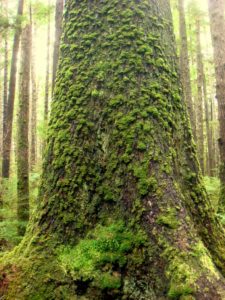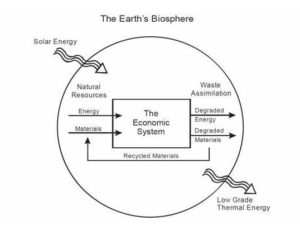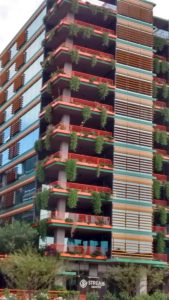It has been noted that despite the pandemic, the natural world doesn’t care and perhaps is even doing better since the economy has been shuttered.

The economy has most assuredly moved down the world’s priority list. Health, family, friends are now more important. Recently, recreation’s value has been highlighted as has the benefit of greenspace.
 We at Autocase have always been operating on this premise. The economy serves us, economic growth is not an end in and of itself. The economy is part of the environment or a larger ecosystem – the earth’s biosphere. There is the economy and there are the things that are outside of the market economy – things that matter. Externalities that we don’t usually put a price on because they affect mostly other people and less so us.
We at Autocase have always been operating on this premise. The economy serves us, economic growth is not an end in and of itself. The economy is part of the environment or a larger ecosystem – the earth’s biosphere. There is the economy and there are the things that are outside of the market economy – things that matter. Externalities that we don’t usually put a price on because they affect mostly other people and less so us.
There are many things that are important that are not counted in the economy: health, quality of life, and things that affect the ecosystem but are not priced such as air and water quality, and climate change. These are the things that are recovering as the economy is slowly dismantled for other priorities.

By User: Gaeanautes – Own work, CC0, https://commons.wikimedia.org/w/index.php?curid=69506349
Effectively shutting down the worldwide economy has a huge economic cost. But the benefits are obvious, incontrovertible, and governments and economists have (mostly) decided that they outweigh the costs of the shutdown.[1] It is this thinking – that we value life and the quality of that life above financial returns that gives us hope that there is a change in our collecting thinking.
Mark Carney wrote “Value will change in the post-covid world … the traditional drivers of value have been shaken, new ones will gain prominence, and there’s a possibility that the gulf between what markets value and what people value will close.”[2]
“As the philosopher Michael Sandel has argued, in recent decades, subtly but relentlessly, we have been moving from a market economy to a market society. Increasingly, to be valued, an asset or activity has to be in a market. For example, Amazon is one of the world’s most valuable companies, yet the Amazon region appears on no ledger until it is stripped of its foliage, and converted to farmland.”
“The price of everything is becoming the value of everything. This crisis could help reverse that relationship, so that public values help shape private value. When pushed, societies have prioritised health first and foremost, and then looked to deal with the economic consequences.”
As we re-build the economy, we need to make sure the value of important goods and services are correctly reflected in wages and prices so that public values help shape private value.
 Our post-pandemic call to arms:
Our post-pandemic call to arms:
- Value the environment: clean air, water, land, trees, green infrastructure, species, habitat and ecosystems.
- Be holistic – incorporate hidden costs and spillover effects into decision making.
- Value people and professions based on their societal contributions.
- Use the full carbon story: embedded carbon, carbon from construction, operations, and end of life.
- Prioritize using triple bottom line thinking: people, planet, and profit.
The next posts will cover: Setting a New & Better Course; and, TBL-CBA and the Post-Pandemic Stimulus.
——————————————————
[1] “is the cure possibly worse than the disease? Worded more clearly, is all of this economic damage a fair trade for the number of lives that will be saved? In the end, governments are likely doing the right thing. The potential human toll is not fully understood, and it would be dangerous to gamble that the disease proves less deadly than feared. From a hardhearted financial perspective, even if the fatality rate lands in the relatively low 0.5% to 1.0% range, the potential lives saved from aggressive preventative action are such that the economic sacrifice comes down to a (very, very rough!) US$200,000 per life saved. That might sound like a large sum for a single person, but legal judgements and other precedents argue that it is a reasonable price. Of course, what gets missed in this analysis are the deleterious effects of increased isolation and additional poverty from social distancing and a weaker economy, respectively.” https://www.rbcgam.com/en/ca/article/macromemo-march-23-march-27-2020/detail?utm_id=wm3398560779344685. Note too that this does not count any possible positive effects of an economic slowdown – such as less deaths from less pollution. In effect, we are through the “cure” also Economists often measure the value of a life saved by the value of statistical life. The value is around $7 million (https://www.nber.org/papers/w9487.pdf). And in case you believe that the value of statistical life for old people is much lower, its is not. Indeed it is likely well above the cost in terms of economic loss per person quoted above. (https://www.mitpressjournals.org/doi/pdfplus/10.1162/rest.90.3.573, and https://bit.ly/39kpgsD)
[2] “The world after covid-19 – Mark Carney on how the economy must yield to human values”, The Economist, April 26, 2020, https://www.economist.com/by-invitation/2020/04/16/mark-carney-on-how-the-economy-must-yield-to-human-values
0 Comments